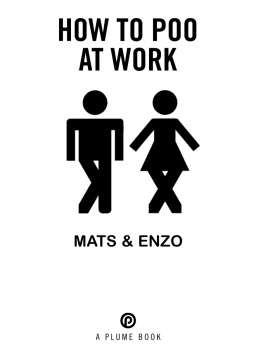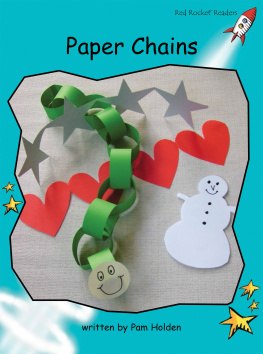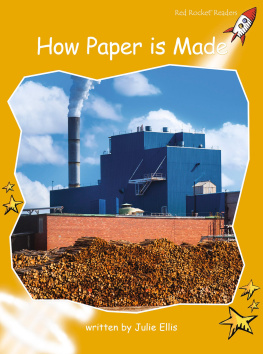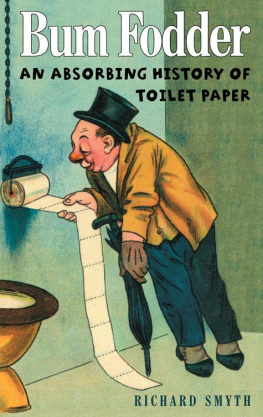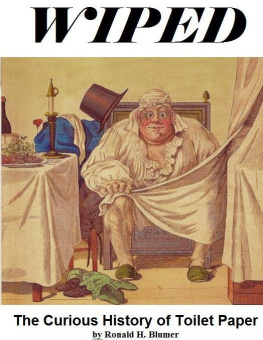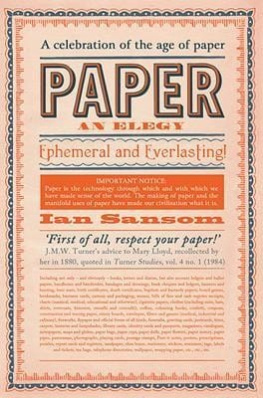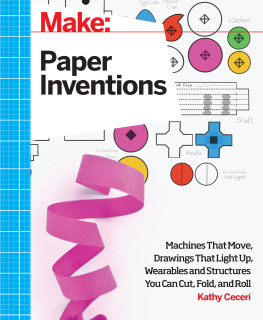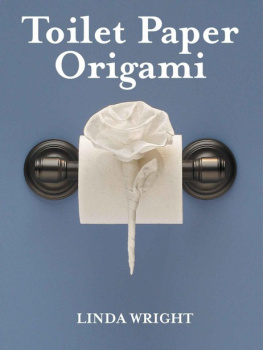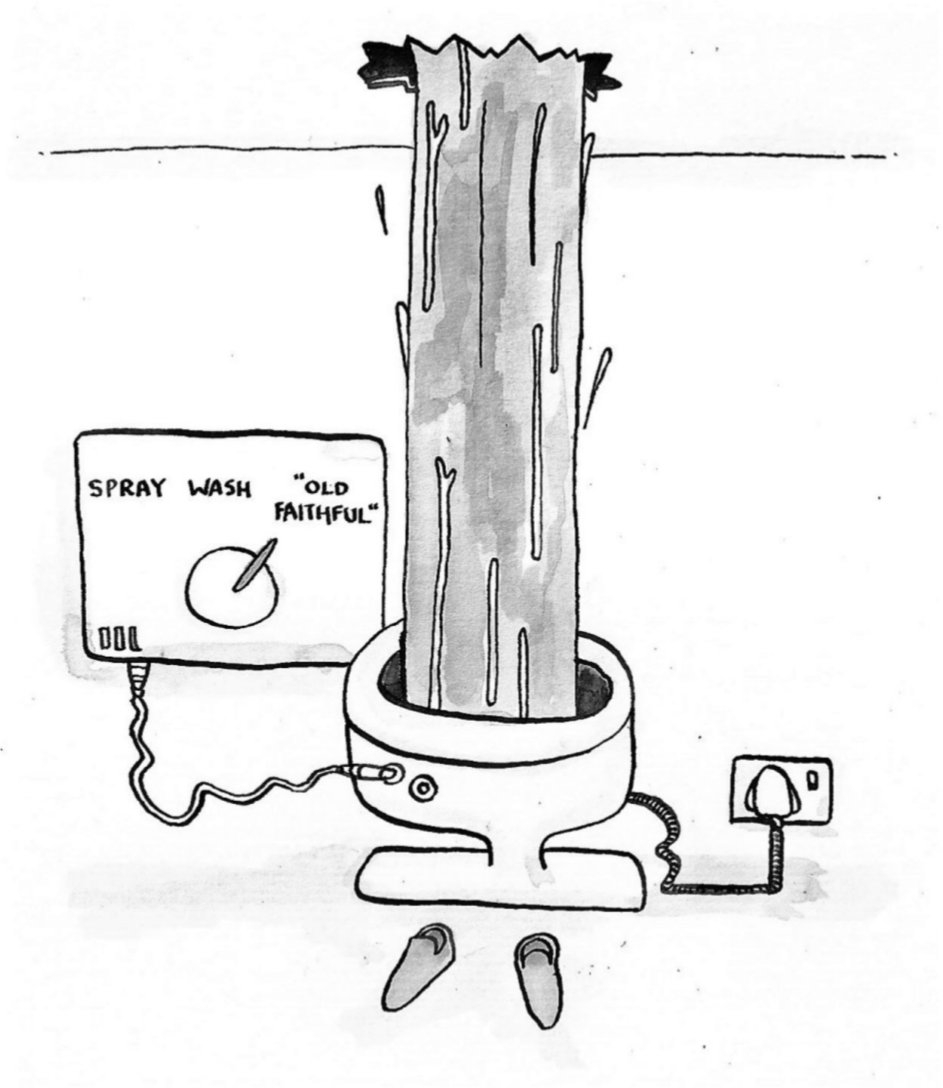Bumfodder, n. Also bumf, bumph. Toilet paper.
Oxford English Dictionary
To wipe is human.
And for most of us in the western world, to wipe is to wipe with paper. In the UK alone, the market is worth around 600 million a year; worldwide, toilet paper equivalent to some 27,000 trees is flushed away every single day. In the US, in particular , loo-roll use has assumed gargantuan proportions; the average American uses 57 sheets per day, or 20,805 sheets per year 50 per cent more than the average Brit. In total, Americans spend $8 billion a year on toilet paper.
But for all our Andrex and our Charmin, our multi-ply and our super-soft, we are only ever playing catch-up in this field of endeavour. We are always riding or, rather, wiping on someone elses coat-tails.
As with all great inventions, China got there first.
They got there first with the decimal system, the compass, the wheelbarrow, silk, printing and gunpowder, and its probably only a matter of time before archaeo-sinologists dig up a Han dynasty SmartPhone and they got there first with toilet-paper , too.
The first step was the invention of paper. They did that in around 100 CE: somewhat improbably, its attributed to a single man, Tsai Lun, who derived sheets of proto-paper from a mash of mulberry, fishing nets, old rags, and hemp waste.
Sadly, the name of the first man to apply this cutting-edge technology to his backside has been lost to posterity. But we do know that paper had made the transition from craft material to bumfodder by the end of the 6th century. In 589, the refined scholar and court official Yan Zhitui agonised over the below-stairs deployment of fine literature:
Paper on which there are quotations or commentaries from Five Classics or the names of sages, I dare not use for toilet purposes.
During the 9th century, a Muslim visitor to China remarked that the Chinese are not careful about cleanliness, and they do not wash themselves with water when they have done their necessities; but they only wipe themselves with paper.
A few hundred years later, the Chinese toilet-paper industry was booming. In the early 14th century, during the reign of the Yuang dynasty, a million packets of toilet-paper, each comprising between a thousand and ten thousand sheets, were being produced each year in Zhejiang province alone but then, there are a lot of people in China (the population of Zhejiangs major city, Linan, was around a million in 1275), and therefore, it can safely be assumed, a lot of bottoms.
In 1393, seven hundred and twenty thousand 2ft 3ft sheets were manufactured for the sole use of the Imperial court at Nanjing; according to the Imperial Bureau of Supplies, a further fifteen thousand sheets were made for the family of the Emperor, Hongwu. These sheets were made particularly soft, to suit delicate royal behinds, and were perfumed. Such sensitivity was not typical of Hongwu: having started life as a starving orphan and progressed to the Imperial throne via a career as a wandering mendicant, he was, by any standard, a brutal despot. Among his many innovations was the use at court of heavy bamboo, as what we might today call a performance incentive for the civil service. Under Hongwus rule, many a scholar-official was beaten to death with bamboo staves for the least infraction.
The story of the Emperors toilet paper serves as a reminder that even vicious dictators have their tender spots.
In China, Burma and Vietnam, much toilet paper is still manufactured by hand; the International Paper Museum at the Research Institute of Paper History and Technology in Brookline, Massachussetts, claims to have the worlds largest collection of this kind of paper.
But 2ft 3ft mulberry-based toilet-paper sheets are not what we would normally expect to arrive in our supermarket delivery when we have ticked the box for Loo Rolls, SuperSaver Family Pack. We have come a long way since Hongwus day.
In fact, it might be said that millions of people in the world today exist in a post-paper age. They would certainly say so in Kokura, Japan the ancestral home of the Washlet.
Just as the Chinese dragged bum-cleansing into the 6th century with their high-tech mulberry wipes, their neighbours across the East China Sea have applied third-millennium science to bringing the practice bang up to date.
Toyo Toki Ltd was founded in Kokura by Kazuchika Okura in 1917 to bring western-style sanitary ceramics to a Japan in which wooden bathroom-ware was still the order of the day. Renamed Toto, the firm soon came to dominate the burgeoning Japanese sanitaryware market. Then, in 1980, Toto launched the Washlet. The future had arrived. We werent in Kansas any more.
The product of many years research in bottom-centric ergonomics, the Washlet delivered a triple-whammy of toilet comforts: its heated seat kept your buttocks cosy, a jet of warm water hosed you down, and a gust of air dried you off.
An iconic TV advert made the case for the new technology. A winsome young girl in a floral dress tries to wipe a dollop of black ink from her hand with a paper tissue but succeeds only in making a dreadful mess. Oh no!
Paper wont fully clean it, the girl explains to camera. Its the same with your bottom.
Cut to a forbidding-looking Washlet nozzle, which promptly squirts a jet of water four feet into the air. The proceedings are brought to a close by the girl presenting her bottom to the viewer and a jovial choir performing the Toto Washlet! jingle.
Early indications were that Japan was not ready for the Washlet revolution. The TV advert triggered a flood of complaints from resolutely old-school Japanese toilet-goers. First this porcelain nonsense, the trend of conservative thought seems to have been, and now paper-free cleansing! Whatever next? They probably werent much mollified by another ad that warned: Dont let people say behind your back that you have a dirty bottom!
But the Luddites as usual lost out. By 2009, 72 per cent of Japanese households were equipped with a Washlet or equivalent device (bear in mind that, at the same time, only 30 per cent had a dishwasher). Having taken 18 years to sell its first 10 million Washlets, Toto announced in February 2011 that they had just sold their 30 millionth. The Petit Washlet, a fold-away model that could be carried in a ladys handbag, broke further new ground. The most up-to-date model the Toto Neolet Washlet-integrated Toilet features a remote control, a sensor-operated lid that opens and closes automatically , a tornado flush, an air filter, and a range of rinsing options (from soft wash to hold on tight! oscillating wash).
This is a brave new world indeed. How did we get here? Well, its been a long journey. The road has not been easy; it has, on the contrary, been bumpy, uncomfortable, and at times startlingly abrasive.
Its a journey that, like all journeys, comes with a story. This is the story of mankinds pursuit of gentleness in an unforgiving world. It is the story, in short, of bumfodder.
A fool is a man who has never tried an experiment in his life.
Erasmus Darwin
Hygiene in one form or another is a concept thats been observed throughout the animal kingdom. Birds keep their nests clean and tidy, ants groom themselves to remove fungal pathogens, even nematode worms steer clear of their disease-carrying peers so, inevitably, we dont have the sharp end of this particularly pyramid entirely to ourselves.
To wipe might be human, but it doesnt separate us from the animals. They do it too.
The chimpanzees of central Africa are our principal co-wipers . Jane Goodall is one of a number of primate scientists to have observed mother chimps diligently wiping their childrens behinds with leaves; adults (who have also been known to swab down their private parts after sex) often work the same trick on themselves, especially if faecal matter has got somewhere it shouldnt be. One study reported that an adult male wiped feces from his back soiled by another male using a leafy twig before, one imagines, having a quiet but firm word with the other male in question.




